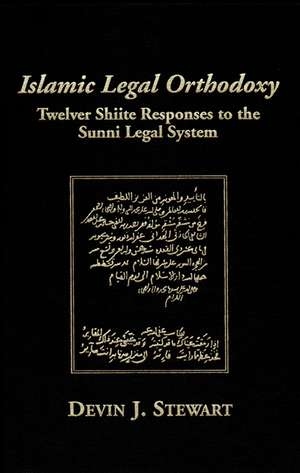Islamic Legal Orthodoxy
Autor Devin J Stewarten Limba Engleză Paperback – 22 mar 2007
Stewart points to an underlying tension in Shi'ite intellectual history between assimilationist and nativist impulses in the debate over consensus, dissimulation, and in the lives of certain Shi'ite scholars who lived and studied among Sunnis.
One of the most far-reaching developments in the history of Islam was the rise of the four classic Sunni schools of law between the ninth and eleventh centuries CE. Consolidation of these schools went hand in hand with the establishment of jurists’ dominance over religious discourse and social institutions. Orthodoxy came to be defined as the consensus (ijma’) of the Sunni jurists. Devin Stewart argues that it is to the margins of the emerging system that investigators must look to understand its historical dynamics. The development of Twelve Shi’ite jurisprudence in relation and reaction to the Sunni schools is particularly informative.
In Islamic Legal Orthodoxy, Stewart explores the process by which Shi’ite jurists participated in the mainstream of Islamic jurisprudence and were influenced by Sunni legal doctrines. He identifies three main reactions to Sunni legal definitions of othodoxy and the concept of consensus on which it was based. The Akhbaris rejected Sunni legal consensus and juristic authority for a scripture-based system; many Shi’ite outwardly accepted the ground rules of Sunni legal consensus and joined the Shafi’i school of jurisprudence; a third option was to adopt the concept of consensus to create a “fifth,” Shi’ite, legal system.
The development of the Sunni legal system effectively set the ground rules for the marginal sect’s negotiation of their identity with respect to Islamic legal orthodoxy. Accordingly, Shi’ite jurists developed a legal institution that is structurally similar to the four Sunni madhhabs and even today serves as means to position themselves in the Muslim world. Stewart points to an underlying tension in Shi’ite intellectual history between assimilationist and nativist impulses in the debate over consensus, dissmulation (taqiyyah) and the lives of certain Shi’ite scholars who lived and studies among Sunnis.
One of the most far-reaching developments in the history of Islam was the rise of the four classic Sunni schools of law between the ninth and eleventh centuries CE. Consolidation of these schools went hand in hand with the establishment of jurists’ dominance over religious discourse and social institutions. Orthodoxy came to be defined as the consensus (ijma’) of the Sunni jurists. Devin Stewart argues that it is to the margins of the emerging system that investigators must look to understand its historical dynamics. The development of Twelve Shi’ite jurisprudence in relation and reaction to the Sunni schools is particularly informative.
In Islamic Legal Orthodoxy, Stewart explores the process by which Shi’ite jurists participated in the mainstream of Islamic jurisprudence and were influenced by Sunni legal doctrines. He identifies three main reactions to Sunni legal definitions of othodoxy and the concept of consensus on which it was based. The Akhbaris rejected Sunni legal consensus and juristic authority for a scripture-based system; many Shi’ite outwardly accepted the ground rules of Sunni legal consensus and joined the Shafi’i school of jurisprudence; a third option was to adopt the concept of consensus to create a “fifth,” Shi’ite, legal system.
The development of the Sunni legal system effectively set the ground rules for the marginal sect’s negotiation of their identity with respect to Islamic legal orthodoxy. Accordingly, Shi’ite jurists developed a legal institution that is structurally similar to the four Sunni madhhabs and even today serves as means to position themselves in the Muslim world. Stewart points to an underlying tension in Shi’ite intellectual history between assimilationist and nativist impulses in the debate over consensus, dissmulation (taqiyyah) and the lives of certain Shi’ite scholars who lived and studies among Sunnis.
Preț: 186.68 lei
Preț vechi: 233.01 lei
-20% Nou
Puncte Express: 280
Preț estimativ în valută:
35.72€ • 37.30$ • 29.56£
35.72€ • 37.30$ • 29.56£
Carte indisponibilă temporar
Doresc să fiu notificat când acest titlu va fi disponibil:
Se trimite...
Preluare comenzi: 021 569.72.76
Specificații
ISBN-13: 9780874809107
ISBN-10: 087480910X
Pagini: 288
Dimensiuni: 152 x 229 x 25 mm
Greutate: 0.43 kg
Editura: University of Utah Press
Colecția University of Utah Press
ISBN-10: 087480910X
Pagini: 288
Dimensiuni: 152 x 229 x 25 mm
Greutate: 0.43 kg
Editura: University of Utah Press
Colecția University of Utah Press
Recenzii
"Meticulously and thoroughly referenced and will undoubtedly serve as a touchstone for future scholarship in the area."
—Islamic Law and Society
—Islamic Law and Society
"The subject of the book is certainly an important one for a proper understanding of the evolution of Twelver Shiism and has so far not received sufficient attention in Islamic studies. Brings out new data and insights."
—Journal of the American Oriental Society
—Journal of the American Oriental Society
Cuprins
Conventions and Abbreviations
1. Introduction
2. Islamic Legal Orthodoxy
3. Conformance to Consensus: Twelver Shiite Participation in the Shafi'i Madhhab
4. Adoption of Consensus: The Foundation of th Twelver Shiite Madhhab
5. Rejection of Consensus: Twelver Akhbarism as an Anti-Madhhab Movement
6. A Comparison of the Sunni and Twelver Shiite
7. Conclusion
Acknowledgments
References
Index
1. Introduction
2. Islamic Legal Orthodoxy
3. Conformance to Consensus: Twelver Shiite Participation in the Shafi'i Madhhab
4. Adoption of Consensus: The Foundation of th Twelver Shiite Madhhab
5. Rejection of Consensus: Twelver Akhbarism as an Anti-Madhhab Movement
6. A Comparison of the Sunni and Twelver Shiite
7. Conclusion
Acknowledgments
References
Index
Descriere
This book surveys and analyzes Twelver Shiite relations with the Sunni legal establishment, comprising the four recognized Sunni legal schools, which the author defines as "Islamic Legal Orthdoxy."
